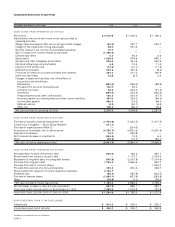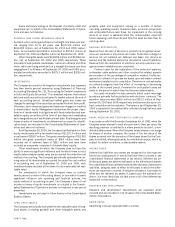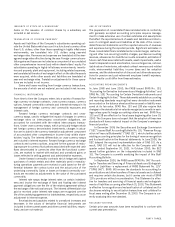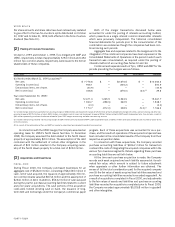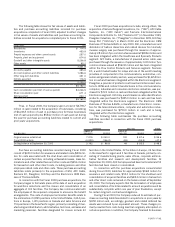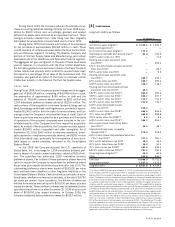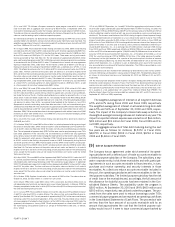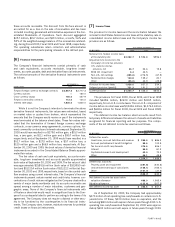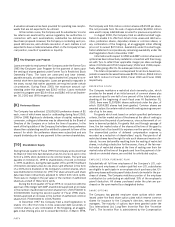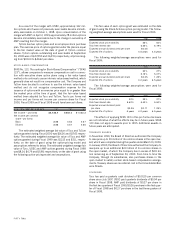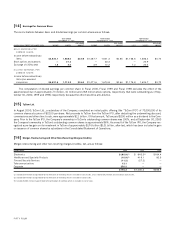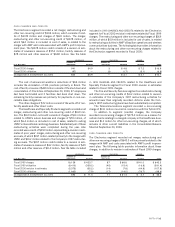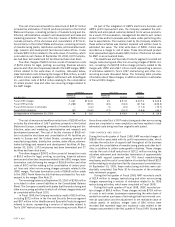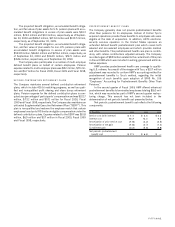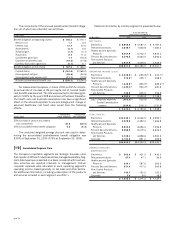ADT 2000 Annual Report Download - page 52
Download and view the complete annual report
Please find page 52 of the 2000 ADT annual report below. You can navigate through the pages in the report by either clicking on the pages listed below, or by using the keyword search tool below to find specific information within the annual report.
FIFTY
A valuation allowance has been provided for operating loss carryfor-
wards that are not expected to be utilized.
In the normal course, the Company and its subsidiaries’ income
tax returns are examined by various regulatory tax authorities. In
connection with such examinations, substantial tax deficiencies
have been proposed. However, the Company is contesting such pro-
posed deficiencies, and ultimate resolution of such matters is not
expected to have a material adverse effect on the Company’s finan-
cial position, results of operations or liquidity.
[8 ] Key Employee Loan Program
Loans are made to employees of the Company under the Former Tyco
1983 Key Employee Loan Program for the payment of taxes upon
the vesting of shares granted under Former Tyco’s Restricted Stock
Ownership Plans. The loans are unsecured and bear interest,
payable annually, at a rate which approximates the Company’s incre-
mental short-term borrowing rate. Loans are generally repayable in
ten years, except that earlier payments are required under certain
circumstances. During Fiscal 2000, the maximum amount out-
standing under this program was $26.0 million. Loans receivable
under this program were $11.4 million and $18.6 million at Septem-
ber 30, 2000 and 1999, respectively.
[9 ] Preference Shares
The Company has authorized 125,000,000 preference shares of $1
each, none of which were issued or outstanding during fiscal 2000,
1999 or 1998. Rights as to dividends, return of capital, redemption,
conversion, voting and otherwise may be determined by the Board of
Directors of the Company on or before the time of issuance. In the
event of the liquidation of the Company, the holders of any preference
shares then outstanding would be entitled to payment to them of the
amount for which the preference shares were subscribed and any
unpaid dividends prior to any payment to the common shareholders.
[1 0 ] Shareholders’ Equity
During the last quarter of Fiscal 1999, the Company announced that
its Board of Directors had declared a two-for-one stock split in the
form of a 100% stock dividend on its common shares. The split was
payable on October 21, 1999 to shareholders of record on October
1, 1999. In addition, during the last quarter of Fiscal 1997, the Board
of Directors declared a two-for-one stock split effected in the form
of a 100% stock dividend on the Company’s common shares, which
was distributed on October 22, 1997. Per share amounts and share
data have been retroactively adjusted to reflect both stock splits.
There was no change in the par value or the number of authorized
shares as a result of these stock splits.
During the third quarter of Fiscal 1999, in conjunction with the
approval of the merger with AMP, shareholders approved an increase
in the number of authorized common shares from 1,503,750,000 to
2,500,000,000. During the second quarter of Fiscal 1998, share-
holders approved an increase in the number of authorized common
shares from 750,000,000 to 1,503,750,000.
In December 1997 the Company filed a shelf registration to
enable it to offer from time to time unsecured debt securities or
common shares, or any combination of the foregoing, at an aggre-
gate initial offering price not to exceed $2.0 billion. In March 1998,
the Company sold 50.6 million common shares at $25.38 per share.
The net proceeds from the sale of approximately $1,245.0 million
were used to repay indebtedness incurred for previous acquisitions.
In August 2000, the Company filed an additional shelf regis-
tration to enable it to offer from time to time unsecured debt secu-
rities, preference shares, depositary shares or common shares, or
any combination of the foregoing, at an aggregate initial offering
price not to exceed $2.5 billion. Availability under this shelf regis-
tration statement incorporates any remaining availability under the
shelf registration filed in December 1997.
Information with respect to USSC and AMP common shares and
options has been retroactively restated in connection with their merg-
ers with Tyco to reflect their applicable merger per share exchange
ratios of 0.7606 and 0.7507, respectively (1.5212 and 1.5014, respec-
tively, after giving effect to the subsequent stock splits).
The total compensation cost expensed for all stock-based com-
pensation awards discussed below was $137.4 million, $96.9 million
and $37.1 million for Fiscal 2000, Fiscal 1999 and Fiscal 1998,
respectively.
RESTRICTED STOCK
The Company maintains a restricted stock ownership plan, which
provides for the award of an initial amount of common shares plus
an amount equal to one-half of one percent of the total shares out-
standing at the beginning of each fiscal year. At September 30,
2000, there were 31,397,856 shares authorized under the plan, of
which 10,954,383 shares had been granted. Common shares are
awarded subject to certain restrictions with vesting varying over peri-
ods of up to ten years.
For grants which vest based on certain specified performance
criteria, the fair market value of the shares at the date of vesting is
expensed over the period of performance, once achievement of cri-
teria is deemed probable. For grants that vest through passage of
time, the fair market value of the shares at the time of the grant is
amortized (net of tax benefit) to expense over the period of vesting.
The unamortized portion of deferred compensation expense is
recorded as a reduction of shareholders’ equity. Recipients of all
restricted shares have the right to vote such shares and receive div-
idends. Income tax benefits resulting from the vesting of restricted
shares, including a deduction for the excess, if any, of the fair mar-
ket value of restricted shares at the time of vesting over their fair
market value at the time of the grants and from the payment of div-
idends on unvested shares, are credited to contributed surplus.
EMPLOYEE STOCK PURCHASE PLAN
Substantially all full-time employees of the Company’s U.S. sub-
sidiaries and employees of certain qualified non-U.S. subsidiaries
are eligible to participate in an employee stock purchase plan. Eli-
gible employees authorize payroll deductions to be made for the pur-
chase of shares. The Company matches a portion of the employee
contribution by contributing an additional 15% of the employee’s
payroll deduction. All shares purchased under the plan are pur-
chased on the open market by a designated broker.
SHARE OPTIONS
The Company has granted employee share options which were
issued under five fixed share option plans which reserve common
shares for issuance to the Company’s directors, executives and
managers. The majority of options have been granted under the
Tyco International Ltd. Long-Term Incentive Plan (the “Incentive
Plan”). The Incentive Plan is administered by the Compensation


